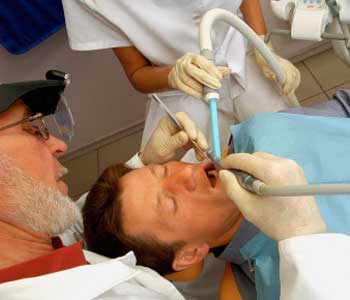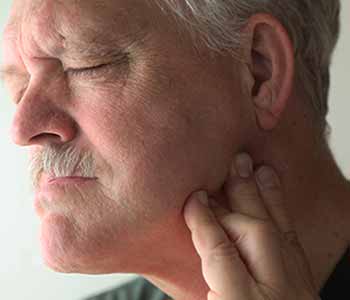TMJ Therapy
 At the back of the jaw are two joints, one on each side. These structures, the temporomandibular joints, keep the jaw stabilized onto the skull and enable you to achieve a number of different movements associated with speaking, chewing, and other oral activities. If problems occur somewhere in the bite or maxillofacial anatomy, it is possible that these joints will cease to function optimally.
At the back of the jaw are two joints, one on each side. These structures, the temporomandibular joints, keep the jaw stabilized onto the skull and enable you to achieve a number of different movements associated with speaking, chewing, and other oral activities. If problems occur somewhere in the bite or maxillofacial anatomy, it is possible that these joints will cease to function optimally.What could cause TMJ Disorder
Research suggests a few distinct factors that may be behind TMJ disorder. The joints themselves may be directly injured through physical contact, such as a whiplash injury. The disc within the joint may move or wear down or the joint may develop arthritis. In many cases, the underlying issue with stress to the temporomandibular joint is bruxism, or clenching and grinding the jaw.What our patients say about us
"At first I was hesitant on switching from my previous dentist, but Advanced Dental Practice is by far the best experience I have ever had. They made me feel comfortable and made sure I got the very best treatment. I am so glad I found these guys. Thank you so much!!"
Jeff C.
Symptoms to look for
TMJ disorder may lead to chronic problems with joint stiffness or tenderness in the jaw, neck and shoulder pain, headaches, limited mobility when opening and closing the mouth, the mouth becomes stuck in an open or closed position, sounds like clicking, popping or grating when the mouth is opened and closed, difficulty chewing, facial swelling, tooth pain or sensitivity, pressure or ringing in the ears, dizziness, or sudden uncomfortable bite.Easing discomfort with home care and professional help
TMJ can be concerning. Dr. Rawat does provide early treatment for TMJ disorder as it suits a patient's needs. In mild cases of stress to the temporomandibular joints, there is the possibility that nightly wear of a mouthguard can diminish the effects of force from bruxism. You may also find relief from mild TMJ disorder with home care such as giving the jaw a rest with softer foods and the avoidance of gum chewing. Because untreated TMJ disorder may keep you from feeling comfortable, it is beneficial to receive a consultation to confirm the cause of your symptoms.Due to the complexity of this condition, more severe cases are referred to a specialist. Contact our office at (508) 456-7111.
We are happy to consult with you about TMJ disorder and discuss treatment options either in our office or with a specialist that can help you enjoy your life.
Call now (508) 456-7111 Or Request an Appointment
Call now (508) 456-7111 Or Request an Appointment
Related Articles
Dental Meridian Tooth Chart
Video Gallery
TESTIMONIALS


Jeff C.
At first I was hesitant on switching from my previous dentist, but Advanced Dental Practice is by far the best experience I have ever had. They made me feel comfortable and made sure I got the very best treatment. I am so glad I found these guys. Thank you so much!!
 View More
View More















